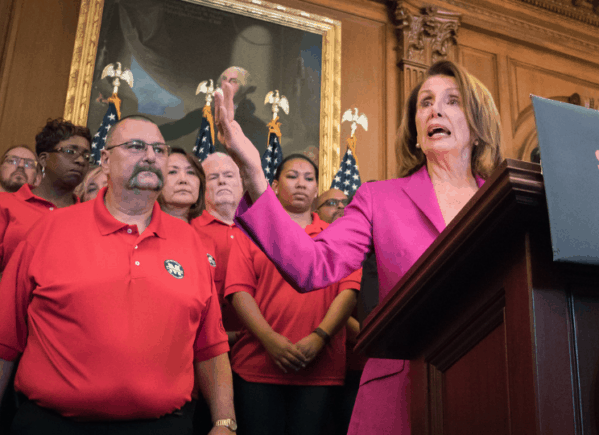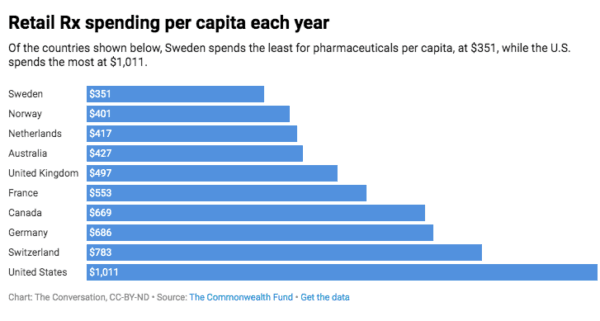
House Speaker Nancy Pelosi released the Democratic leadership’s Rx pricing bill Thursday
No sooner had Nancy Pelosi unveiled legislation to lower prescription drug prices, than House Republicans rejected it on the usual grounds. According to GOP orthodoxy, any attempt by the government to rein-in runaway prescription prices amounts to “interfering” with the “free market.” To the extent that the pharmaceutical market honestly can be called “free” (given the industry’s patent monopolies and suppression of cheaper, generic medications), it has failed spectacularly to provide affordable prescription drugs to consumers, including seniors on fixed incomes.
Kaiser reports that Republicans object to three main provisions of the Democratic leadership’s bill, namely that it would:
* Allow Medicare to negotiate drug prices with pharmaceutical companies
* Link U.S. drug prices to the lower prices paid overseas.
* Limit how fast drug companies can raise their prices.
Though Pelosi’s bill incorporates parts of Republican proposals to lower drug cost – and adopts one of President Trump’s favorite fixes (pegging prices to what other countries pay) – ranking House Ways and Means Committee member Kevin Brady (R-TX) described it in sinister terms:
“(Speaker Pelosi’s bill is) more accurately a ‘dictate or destroy’ price control power that will halt valuable research into new lifesaving medicines and give foreign countries dangerous influence over America’s health care system.” – Rep. Kevin Brady (R-TX), ranking member of House Ways & Means Committee
Is Rep. Brady speaking of “dangerous” countries like Germany, which pays 33% less than Americans do for drugs… or the United Kingdom (50% less)… or Sweden, where prescriptions cost 65% less than in the U.S.A.?

The Democrats are on target here. The Speaker’s legislation does not aim to destroy the free market, but rather to curb its gross excesses. Big Pharma has been steadily raising drug prices during the past two decades, in the absence of any real price controls. Meanwhile, the industry’s profits have soared, as has CEO compensation. The industry spends billions on lobbying and marketing – more than $6 billion for ads alone in 2018. That’s great for Big Pharma and its shareholders, but bad for consumers, especially seniors who are forced to ration pills or choose between vital medications and other essentials like groceries and rent. It also adds to Medicare’s costs, which accrue to the taxpayers.
Republican objections to commonsense regulation of drug prices starts to break down where the wallet meets the cash register, so to speak. Prescription medications are not just another consumer good like watches and cars. They are essential to Americans’ health – and often make the difference between life and death. “Pharmaceutical companies are putting profits first, and the public good second,” says Dan Adcock, the National Committee’s director of Government Relations and Policy.
Adcock recalls that a pharmaceutical industry lobbyist at a health care reform gathering a few years ago was heard to say, “If people can’t afford prescription drugs, they should get loans.” That attitude may or may not be indicative of the industry’s as a whole, but if Big Pharma insists on raising prices well beyond what most Americans can afford, and if seniors are forgoing necessary medications because of increasing costs, it is time for the federal government to step in and restore some fairness to the prescription drug market.


